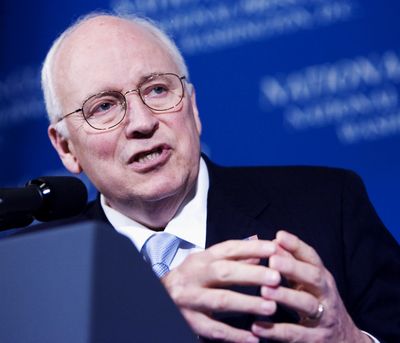Memos reveal CIA’s inconclusive results
Difficult to assess success of harsh interrogations

WASHINGTON – For months, former Vice President Dick Cheney has argued that the worth of the Bush administration’s aggressive interrogation program was proven in two secret CIA memos that he urged be released.
But those documents, and others that were finally unsealed Monday, are at best inconclusive – attesting that captured terrorists provided critical intelligence on al-Qaida and its plans, but offering little to support the argument that harsh or abusive methods were key.
The memos and a long-secret CIA inspector general report released the same day filled in details about the agency’s embrace of harsh methods to get prisoners to talk. But they did not resolve a question that now seems likely to follow the Bush administration into the history books: Was it necessary to push moral and legal limits of detainee treatment to safeguard the country?
President Barack Obama has insisted that the answer is no. Obama set up a special task force in January to examine interrogation options, but the panel steered clear of considering inclusion of so-called “enhanced” techniques.
Obama this week endorsed a task force recommendation to create a new elite interrogation unit – drawn on experts from across the government, not just the CIA – that will abide by U.S. military guidelines when questioning terrorism suspects.
But Cheney lashed out at the Obama administration again, and refused to back away from his assertion that harsh interrogation methods worked.
The newly released documents “clearly demonstrate that the individuals subjected to enhanced interrogation techniques provided the bulk of the intelligence we gained about Al Qaeda,” Cheney said Monday night in a statement released by his office.
Obama’s decision to allow the Justice Department to open a criminal probe of interrogators’ conduct, and move authority for questioning prisoners away from the CIA, “serves as a reminder, if any were needed, of why so many Americans have doubts about this administration’s ability to be responsible for our nation’s security,” Cheney said.
Responding to the criticism, an Obama administration official involved in the interrogation task force noted that the Bush administration itself had banned the most severe CIA methods years ago. The official was not authorized to speak publicly.
“Cheney seems to be the only one out there who wants to defend waterboarding as a lawful technique,” the official said.
The CIA inspector general report is likely to provide ammunition to people on both sides of the argument. In one section, it suggests that the number of intelligence reports surged when waterboarding was used on two high-ranking al-Qaida captives, Abu Zubaydah and Khalid Sheikh Mohammed.
Mohammed “provided only a few intelligence reports prior to the use of the water-board, and analysis of that information revealed that much of it was outdated, inaccurate or incomplete,” the report said.
It goes on to note that Mohammed was then waterboarded 183 times in March 2003, but the rest of the paragraph, which presumably discusses the results, remained blacked out.
In its top conclusion, the report said the interrogation program had provided intelligence “that has enabled the identification and apprehension of other terrorists and warned of terrorist plots planned for the United States.”
But without being able to isolate the many variables involved in getting information, the report said, the effectiveness of specific techniques “cannot be so easily measured.”
In an interview Tuesday, the author of the CIA report, former inspector general John L. Helgerson, said: “You could not in good conscience reach a definitive conclusion about whether any specific technique was especially effective, or the enhanced techniques in the aggregate really worked.”
The memos that Cheney urged be declassified are similarly inconclusive.